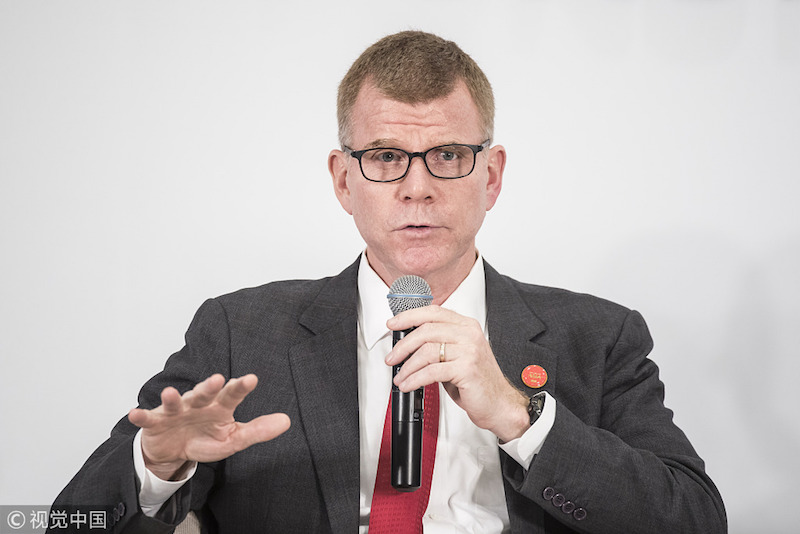
Stephen Groff, vice president of the Asian Development Bank (Photo: VCG)
Manila (People’s Daily)- On the sidelines of 12th China-ASEAN Forum on Poverty Reduction and Social Development held on Wednesday in Manila, the Philippines, Stephen Groff, vice president of the Asian Development Bank (ADB), gave an exclusive interview to the People’s Daily.
PD: How do you comment on China’s social and economic changes resulting from the country’s reform and opening-up in the last 40 years?
Groff: It is obvious that China has undergone an enormous change, especially the huge reductions in poverty across China—a fact we discussed at today’s forum on poverty reduction and social development.
Development is achieved through hard work, rarely linear, and we can never rest on our laurels. For that reason, we are pleased to work with China on a number of major fronts, including rural revitalization. When we started our investments in China 30 years ago, we worked across the country. Given the fact that poverty tends to exist in the countryside, nowadays our work is more concentrated in poor and remote regions in line with plans to eradicate poverty across the country. It is often said that the last mile of a journey is the hardest, but we are committed to see this endeavor through.
PD: What is your opinion on the progress of China’s poverty reduction? How is China’s role important in the global and regional undertakings of poverty reduction?
Groff: At today’s session, we discussed China’s experience at length, particularly on the admirable reduction of poverty incidence to 3%.
I made the point that most people shake off poverty as a result of their own efforts and behind the remarkable statistic of the PRC in poverty reduction are hundreds of millions of individuals whose efforts should be recognized. China’s success is grounded in its people’s desires to work, good education provided by the government, and active support of entrepreneurship.
At the same time, the PRC’s massive investments in infrastructure have created significant opportunities across the public and private sectors. Certainly, the PRC has a profound understanding of the relationship between employment and poverty. However, many people are not capable of working, such as the elderly and the disabled. A good social welfare system is crucial to guarantee people do not fall through the cracks, and this is another aspect where China has made significant efforts.
I should add that ADB is privileged to have worked for over 30 years on both fronts: employment creation and social protection. Under the Regional Knowledge Sharing Initiative (RKSI), which sponsored the ASEAN-China Forum today, we will be sharing lessons from successful poverty reduction across the Asia and Pacific region.
PD: In the four decades of reform and opening-up in China, a lot of social and economic approaches have been explored, such as the development path suitable for special national conditions, special economic zones, and keeping the national door open to the world. What is your comment on these experiences? Do you think they are worth learning for other development countries?
Groff: Absolutely! We have a joint program with the (Chinese) government, sharing the Chinese experience in development with other developing member countries of ADB. We work with leading Chinese centers of knowledge covering areas like poverty reduction and regional cooperation—this ASEAN-China Forum is sponsored by the RKSI. At the same time, China is eager to learn the good practices from elsewhere in the world.
PD: As a member state of ADB, China maintains communication with regional cooperation programs, and makes great efforts to promote regional integration. What is your comment on the cooperation between China and ADB? What is your idea on China’s contribution to regional and global governance?
Groff: We work very closely with China, especially under the frameworks of the Central Asia Regional Economic Cooperation (CAREC) and the Greater Mekong Subregion (GMS) programs, of which China is a member. At the forum today, we discussed the role of regional cooperation in poverty reduction. Growth in China has made it a major export market, which brings business potential for other developing countries’ development, and, in doing so, creates more job opportunities.
PD: The Belt and Road Initiative (BRI) proposed by President Xi Jinping in 2013 is welcomed by almost all countries. How do the countries along the route of the BRI benefit? And how can the BRI integrate with other international cooperation initiatives or mechanisms in the face of the rising protectionism and anti-globalization?
Groff: Early in its development period, China benefited greatly from regional cooperation by reaching out to overseas markets, thus providing a source for its rapid growth.
From the perspective of the ADB, we believe that enhanced regional cooperation can bring great benefits to the people, especially in terms of creating economic and job opportunities.
At today’s forum, we had discussions on the importance of partnership between enterprises and governments, as well as academia in promoting regional cooperation that benefits people. BRI certainly has the potential to promote partnership and deepen cross-border relationships.
ADB’s cooperation with BRI is primarily through the CAREC and GMS programs, both of which serve as a platform of cross-border investment.
(Compiled by Li Lei)


